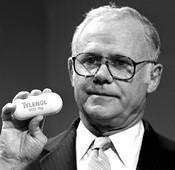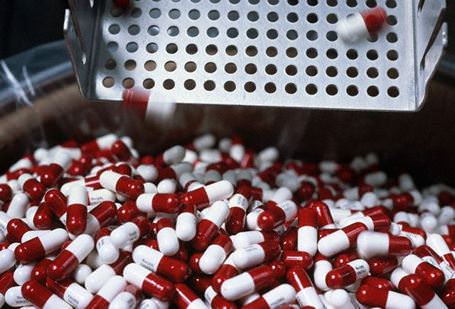The 1980’s Tylenol poisoning murders spurred panic, wide-spread fear, and perhaps the best-ever corporate response to a major public relations crisis. James E. Burke, then CEO of Tylenol-maker Johnson & Johnson, died on September 28 at the age of 87. He will be best known for his strong, decisive leadership and what has widely been recognized as a model of exceptional corporate crisis management. Fortune magazine named him one of history’s 10 greatest CEOs.
There are 5 truths we can learn from Mr. Burke’s handling of the poisoning disaster—lessons in the right way to handle a public relations nightmare.
1. Be forthcoming and honest

J&J was careful to point out that, based on the evidence, the tampering must have occurred at the retail stores. However, they did not attempt to shift blame. They were extremely candid.
Image: James E. Burke with an oversize model of the Tylenol that replaced capsules. Credit: William E. Sauro, The NY Times
Burke “spoke the truth and that was astonishingly liberating for everyone who heard it because we have all become so accustomed to public figures telling less than the truth or lying,” wrote Harvard business professor Richard Tedlow.
2. Act quickly and decisively
According to Tedlow, on the afternoon of the first deaths, the company:
- set up toll-free numbers manned by company employees
- sent 450,000 telex messages to doctors’ offices, hospitals and trade groups
- stopped all Tylenol advertising
On the first day.
3. Take responsibility, even if you don’t have to
Less than one week after the deaths, J&J spent more than $ 100 million recalling 32 million bottles of Tylenol capsules from store shelves. According to a Harvard Business School case study of the incident, the heads of the FDA and FBI felt that a recall would be an overreaction. J&J’s management put customer safety ahead of their financial concerns.
The company also established relations with the Chicago Police Department, FDA and FBI to maintain a role in searching for the person responsible for the deaths, and became the first company to adopt new triple-seal tamper-resistant packaging rules.
4. Treat people with respect
Within months, J&J re-introduced Tylenol capsules to consumers. It distributed over 40 million $ 2.50 coupons (enough to purchase a good-size bottle) to compensate customers who threw away Tylenol during the scare. They also created a new pricing program that saved consumers up to 25%.
In a 1986 news conference, Mr. Burke announced that Johnson & Johnson would stop selling over-the-counter products in capsules, which could be tampered with, and switch to solid caplets. When asked by a reporter if he was sorry the company had not acted sooner. Mr. Burke replied “Yes, indeed I am.”
5. Good behavior pays dividends
As the tough decisions were being made by Mr. Burke and his executive team, many were skeptical. They warned that the company’s reputation would never recover. Time has proved them wrong.
Less than a year after re-launching Tylenol, J&J regained a 30% share of the market and once again became the top-selling pain reliever. Today, Tylenol enjoys the highest ratings for consumer confidence, and is the most prescribed over-the-counter pain reliever.
Ultimately, the decisions were part of a shrewd plan to salvage the reputation and revenue of J&J, and return Tylenol to commanding market share. Even so, Mr. Burke proved that putting the customer first can reap greater rewards than a short-sighted drive to deflect blame and protect share price.
Maintaining a “reservoir of trust” among customers helped see J&J through this defining crisis, and in a 2003 Harvard Business School profile, Mr. Burke noted that “Nothing good happens without trust. With it, you can overcome all sorts of obstacles.”
By Wayne Blankenbeckler, MissionMode Solutions | Crisis Insights blog
Sources: “The Tylenol Crisis: How Effective Public Relations Saved Johnson & Johnson”, Pennsylvania State University | New York Times | Chicago Tribune | Washington Post | BloombergBusinessweek
Image credit, Tylenol capsules: Leif Skoogfors, CORBIS

Speak Your Mind